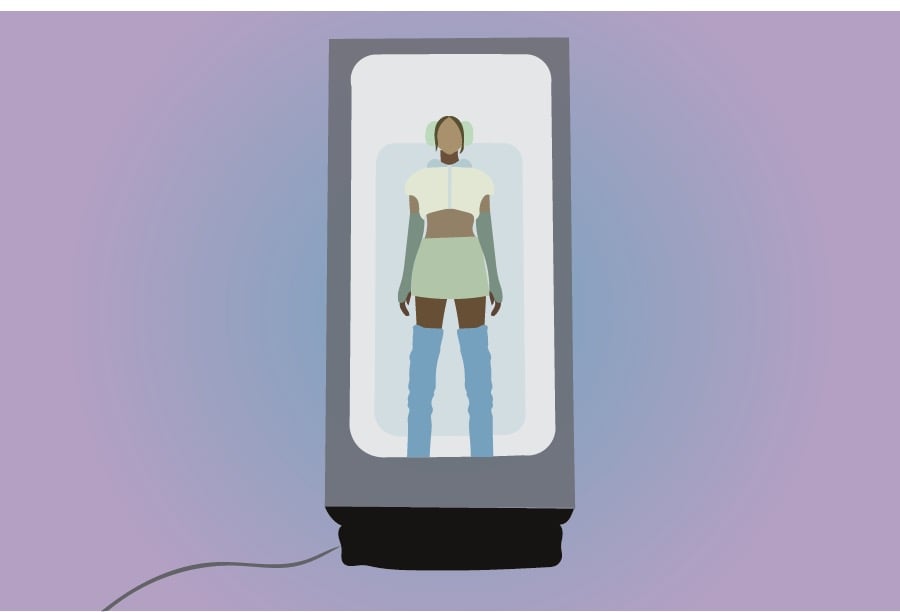Liner notes: Lolo Zouaï’s sophomore album “Playgirl” transports listeners to an alternate, fantastical reality
Lolo Zouaï’s sophomore album, “Playgirl,” was released Friday.
October 17, 2022
Lolo Zouaï’s concept album “Playgirl” takes listeners to a Y2K-reminiscent, kaleidoscopic fantasy world.
The French-Algerian, San Francisco-raised artist, who recently returned from tour with Dua Lipa, released her sophomore album Friday, three years after her successful debut, “High Highs to Low Lows.” Drawing on ethereal R&B, hyphy (Oakland slang for the “hyperactive” music style of the area) pop and Bay Area hip-hop, Zouaï brings us into her chaotic, yet sublimely intoxicating, headspace.
Three distinct characters, based on facets of her personality, unveil Zouaï’s cyber-futuristic vision: Playgirl, Dreamgirl and Partygirl. As Zouaï told Rolling Stone, the titular persona’s songs are creative, fun and bold.
Dreamgirl presents “soft R&B songs that hit the heart, and feel the most nostalgic, sweet and gentle.” But it’s Partygirl, who delineates the darkest, moodiest songs and encourages our worst behavior, that draws me in most.
Playgirl welcomes us to the album on her self-titled track, “pl4yg1rl,” announcing that “it’s 3004” and inviting us to “get (our) headphones, lock up the bеdroom door and log on,” setting the tone for the album’s simultaneously nostalgic and avant-garde escapism. Playgirl next appears in “Gummy Bear,” a catchy, if lyrically shallow, song musing on physical attraction.
The depth of Zouaï’s most playful persona is revealed through “Tamagotchi (intermission),” where she toys with hallmarks of an early 2000s childhood while ruminating on her parents’ divorce. Fittingly, Playgirl closes out the album with “Free Trial,” an upbeat, kittenish account of a short-lived, but intense, relationship that can also describe the trip into Zouaï’s “Playgirl” world.
Interspersed between Playgirl and Partygirl’s four tracks each, Dreamgirl’s five romantic interludes provide a much-needed paradisiacal dimension amid Playgirl’s frenetic energy. Lo-fi-inspired track “VHS” transports listeners to the pink, Hello Kitty-filled room of Zouaï’s childhood dreams.
Dreamgirl’s detached, Elysian reverie continues on “Blur,” the sonic embodiment of a summer fling, as Zouaï muses, “Isn’t it fun? Who cares if you’re the one?” She reaches her apex on “Picking Berries,” a real-life daydream of an evening spent in blissful solitude amid lavender fields in the South of France.
Partygirl brings us to the heart of the album: the dark, complicated underside of a high-spirited, head-in-the-clouds lifestyle. “Crazy Sexy Dream Girl,” Zouaï’s take on the archetypal manic pixie dream girl, explores the undue romanticization of an unstable, passion-driven way of life. On “Room,” Zouaï reflects on the regret and resentment that vulnerability can bring — in relationships and otherwise.
Zouaï’s vision of an alternate, fantastical reality is accompanied by the stark reminder of the impossibility of truly embodying a Playgirl, Partygirl or Dreamgirl. In contrast with her yearning, gritty debut album “High Highs to Low Lows,” a chronicle of her difficulties breaking into the music industry, the transcendental “Playgirl” ventures further than material success, journeying to an untouchable, celestial dimension. However, Zouaï’s vision of perfectly synchronized lively, ethereal, chaotic energy is ultimately untenable.
As Zouaï put it, the “crazy sexy dream girl’s dead.”
Email: [email protected]
Related Stories:
—Liner Notes: Demi Lovato’s living her truth in “Dancing With The Devil…The Art of Starting Over”
—Liner Notes: Conan Gray returns with sophomore album ‘Superache’
—Liner Notes: Coldplay shoots for the stars with “Music of the Spheres”


